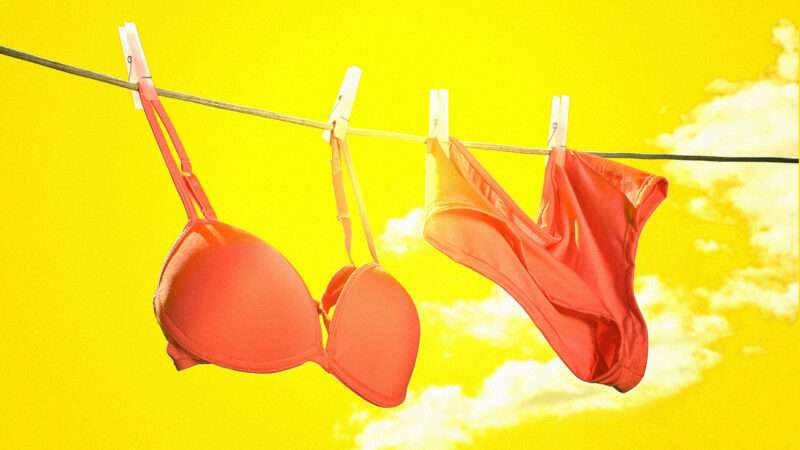Siirry offline-tilaan Player FM avulla!
Why We Can't Have Nice Things: The Ghosts of Protectionism Past
Manage episode 373928209 series 3498470

It's now been nearly 100 years since Congress overhauled the United States' general tariff system—a system that is by now "quite antiquated and designed for a different time and a different economy," says Ed Gresser.
And that's not all, says Gresser, a former assistant U.S. trade representative who now serves as vice president for the Progressive Policy Institute, a left-of-center think tank. The tariff code is also "quite regressive and somewhat misogynist." Inexpensive goods like cheap sneakers are generally taxed at a higher rate than pricier items like leather boots, and women's underwear is charged a higher tariff rate than boxers and briefs.
In the second episode of Why We Can't Have Nice Things, a new podcast series from Reason, we're diving into the weird and wonky tariff system that imposes hidden taxes on Americans every day. Protectionism usually benefits some special interest at the expense of everyone else, but some of the industries supposedly being protected by these tariffs don't even exist in the U.S. anymore.
"The most effective lobbyist in Washington is muscle memory," says Steve Lamar, president and CEO of the American Apparel and Footwear Association.
The supply chains for basic necessities like T-shirts, shoes, and underwear stretch all the way around the world today. But America's tariff code still acts like those are niche domestic industries. On this week's episode of Why We Can't Have Nice Things, we're explaining what that means for consumers and why we've recently moved in the wrong direction—by applying even more tariffs on top of some of the most highly taxed imports.
Further reading for this week's episode:
"U.S. Underwear Tariffs Are Unfair to Women," by Ed Gresser
"U.S. Tariffs on Cheap Stainless Steel Spoons Are 5 Times Higher Than on Sterling Silver Spoons," by Ed Gresser
"The Travels of a T-Shirt in the Global Economy: An Economist Examines the Markets, Power, and Politics of World Trade," by Pietra Rivoli
"If Biden's Trade Policy Was Really Driven by 'Equity,' Trump's Tariffs Would Already Be Gone," by Eric Boehm
Written by Eric Boehm; produced and edited by Hunt Beaty; mixing by Ian Keyser; fact checking by Katherine Sypher
The post Why We Can't Have Nice Things: The Ghosts of Protectionism Past appeared first on Reason.com.
14 jaksoa
Manage episode 373928209 series 3498470

It's now been nearly 100 years since Congress overhauled the United States' general tariff system—a system that is by now "quite antiquated and designed for a different time and a different economy," says Ed Gresser.
And that's not all, says Gresser, a former assistant U.S. trade representative who now serves as vice president for the Progressive Policy Institute, a left-of-center think tank. The tariff code is also "quite regressive and somewhat misogynist." Inexpensive goods like cheap sneakers are generally taxed at a higher rate than pricier items like leather boots, and women's underwear is charged a higher tariff rate than boxers and briefs.
In the second episode of Why We Can't Have Nice Things, a new podcast series from Reason, we're diving into the weird and wonky tariff system that imposes hidden taxes on Americans every day. Protectionism usually benefits some special interest at the expense of everyone else, but some of the industries supposedly being protected by these tariffs don't even exist in the U.S. anymore.
"The most effective lobbyist in Washington is muscle memory," says Steve Lamar, president and CEO of the American Apparel and Footwear Association.
The supply chains for basic necessities like T-shirts, shoes, and underwear stretch all the way around the world today. But America's tariff code still acts like those are niche domestic industries. On this week's episode of Why We Can't Have Nice Things, we're explaining what that means for consumers and why we've recently moved in the wrong direction—by applying even more tariffs on top of some of the most highly taxed imports.
Further reading for this week's episode:
"U.S. Underwear Tariffs Are Unfair to Women," by Ed Gresser
"U.S. Tariffs on Cheap Stainless Steel Spoons Are 5 Times Higher Than on Sterling Silver Spoons," by Ed Gresser
"The Travels of a T-Shirt in the Global Economy: An Economist Examines the Markets, Power, and Politics of World Trade," by Pietra Rivoli
"If Biden's Trade Policy Was Really Driven by 'Equity,' Trump's Tariffs Would Already Be Gone," by Eric Boehm
Written by Eric Boehm; produced and edited by Hunt Beaty; mixing by Ian Keyser; fact checking by Katherine Sypher
The post Why We Can't Have Nice Things: The Ghosts of Protectionism Past appeared first on Reason.com.
14 jaksoa
Kaikki jaksot
×Tervetuloa Player FM:n!
Player FM skannaa verkkoa löytääkseen korkealaatuisia podcasteja, joista voit nauttia juuri nyt. Se on paras podcast-sovellus ja toimii Androidilla, iPhonela, ja verkossa. Rekisteröidy sykronoidaksesi tilaukset laitteiden välillä.




